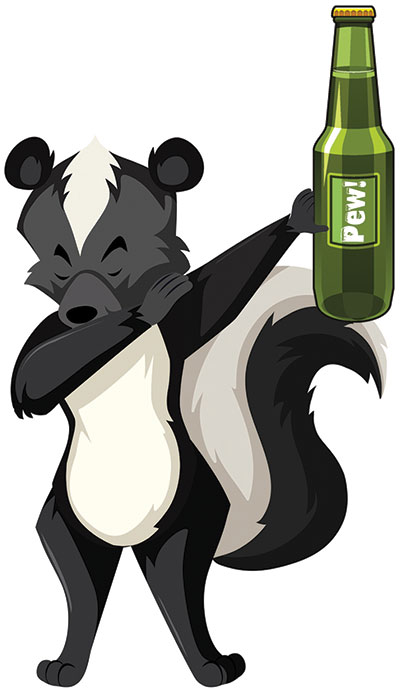by Chris Sands
If you’re a beer drinker, you’ve probably encountered a skunked beer. It smells bad, like, well, skunk spray. And you’ve probably heard the myth that what causes it is when the beer goes from cold to room temperature to cold again. And that’s what that is—a myth.
Several years ago, I was taking a tour of Flying Dog Brewery in Frederick, Maryland. Our guide was talking about how UV light is what causes the skunked smell and flavor of beer. I had heard this explanation many times during brewery tours, but this time I got more detailed information.
The tour guide explained that the molecular structure in hops is similar to the musk of a skunk, except that it has a tail, and that UV light severs it. That molecular transformation is what causes light-struck beer to become skunked. I was quite skeptical because I had never heard it explained that way anywhere else.
Over the years, I brought up that factoid many times without ever finding someone to corroborate the story—until I was recording episode 39 of The Uncapped Podcast. My guest was Mount St. Mary’s University chemistry professor Garth Patterson. He was the perfect person to verify or debunk the explanation. Here is what he said.
“Most of what we would affiliate with a skunk smell would be a chemical that has a sulfur … And so there are sulfur-containing compounds within the beer that are of a particular structure that we wouldn’t attribute to that skunk smell. When they are light struck, exactly what happens (is) it breaks a chemical bond and you go to a smaller chemical that then we perceive as that skunky smell, and that’s where that term comes from.
“I had a student that was interested in that skunky smell and he was able to prove it chemically. So we found in the literature, I forget the name of the chemical now, but we found in the literature what that primary chemical is, and then we intentionally added light and monitored how fast that light striking came up. And it turned out to be almost instantaneous … at the parts per-million level…. Within a half an hour, there was a noticeable amount. And then anytime after that, it was skyrocketing.”
So there we have it, over time, sunlight turns beer into skunk musk!

